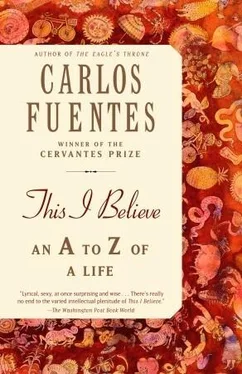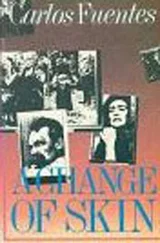“Is Cain the second coming of Evil, no longer as part of the Creation but as part of History?”
“I am not sure. Perhaps the World, after the Fall, is no longer God’s responsibility and becomes the poisonous garden of a Devil that is the gleeful spectator of human suffering. The world becomes the theater of the Devil disguised as God, an exclusive God — that is, one who excludes, who takes away.”
“Is the God who deprives, then, the Devil?”
“Only if God, secretly, privately, feels satisfied, smug. Instead of destroying a world that has betrayed Him from head to toe, why does God give the World a second chance? Noah’s chance, that of escaping the deluge.”
“Because I believe that if Man ceases to exist, God will die without him. Not with him, please understand me. Without him.”
“If the World comes to an end, God is rendered impossible?”
“For Himself, perhaps not. For human beings, yes. And the reason for that is that before killing God, men will have all killed one another first.”
“In that case God is the greatest human invention of all, because He frees us from the other great human invention, History.”
“Don’t you think that perhaps instead God might grow accustomed to the idea that Man commits acts of Evil because Man was created in the image and likeness of God and God, too, is both Good and Evil?”
“Such an idea would test the limits of Faith and would inevitably prove Origen’s point: the grace of God is so great that in the end, it is capable of forgiving the Devil. Because if God is not capable of forgiving Beelzebub, then He would be an insincere and crippled God.”
“Origen ended up castrating himself to prove his faith, never imagining that the Emperor Decius would do him the favor of castrating his entire life for him.”
“Origen puts the limits of Faith to the test. But Faith can only be limitless because it consists of believing the unbelievable. ‘It is true because it is absurd.’ That is how Tertullian defined Faith.”
“Does God also consider it absurd to believe in Him?”
“He couldn’t answer because then He would be saying that Tertullian was right. God is God because He never allows himself to be seen. That is why He demands Faith.”
“Even though He speaks through the voices of children, saints, and lunatics.”
“Probably. But a visible, everyday God sitting in on literary circles in cafés would not be God.”
“He would be Christ.”
“But that is another story entirely.”
“Take a look under ‘C’ in this book.”
“Thank you.”
“So now tell me one thing, which person is superior: the one who believes or the one who doesn’t?”
“For me, doubt does not weaken God, and it strengthens us. There are theologians, like Hans Kung, for whom the modern world and all its comforts are responsible for the loss of faith. For many people, believing in God has become an anachronism. Just as before Copernicus, people believed that the sun revolved around the earth.”
“Does doubt strengthen us as individuals or believers?”
“In your novel La campaña ( The Campaign ), you place these words in the mouth of the guerrilla priest Father Anselmo Quintana:
“. . you can’t fool Him. Little games don’t work with Him. God is the Supreme Being who knows everything, even what we imagine about Him, and he gets ahead of us and imagines us first; and if we go around thinking that believing in Him or not is something that depends on us, He gets ahead of us yet again and finds a way of telling us that He will go on believing in us no matter what, even if we abandon Him and deny Him. . Jesus said to me, ‘Anselmo, my son, don’t be a comfortable Christian; raise hell for the Church, because the Church loves peaceful Christians. I, on the other hand, love pissed-off Christians like you; you gain nothing by being a Catholic without problems, a simple believer, a man of faith who doesn’t even realize that faith is absurd and that is why it is called faith and not reason. . Please. . always be a problem. . Don’t let them pass through your soul without paying for the right at the spiritual customs house; don’t hand your faith over to any ruler, any secular state, any philosophy, any military or economic power without also giving them your mess, your complications, your exceptions, your goddamned imagination. . ’ ”
“That is a call to faith as freedom and as responsibility. How is it lived out with the triumph of Man that Georg Büchner proclaims in Danton’s Death: ‘No longer will it be possible to accuse God, because God does not exist. Rebellious freedom has occupied all the space of the world’?”
“We must ask ourselves what we have done with our rebellious freedom. .”
“We have created science, we have penetrated the secrets of matter, we have improved the living conditions of millions of people, we have eradicated sicknesses that formerly ravaged the human race, we have prolonged human existence, cleared our consciences. .”
“But we have also tortured and killed millions of people in wars fought for political and economic supremacy, motivated by irrational impulses and hatred, prejudice, the cynicism of industrial militarism, the ambition of superpowers, the misery of the helpless. . Don’t we have the right to question aloud, ‘God, what have we done with our rebellious freedom?’ ”
“The terrifying silence of the infinite cosmic void will answer you. Do you give in?”
“No. I prefer to continue doubting, asking questions, debating with you, with me, with the three of us. .”
“Always three, as in the poem by José Gorostiza, ‘Muerte sin fin’ (Death without end). You and I, laid siege by our own epidermis, full of ourselves. Who is the third person? Is it one of us? Is it God? Is it the Other?”
“Let us suppose it is God. And once again, we doubt and we question. Is God co-responsible for the errors of humankind? Does God need to take human failure and turn it into proof of His power? Does He need our failure to test himself? Is God co-responsible for the human horrors that our freedom has bestowed upon us, along with the glory that freedom has also bestowed upon us? Does God know the results of the game before it is played out, or doesn’t He? Is God the great croupier — William Blake’s great ‘old Nobodaddy aloft’—who knows each and every spin of the roulette game before they are played out?”
“Yes, let’s imagine that God knows the future. But does God know what He will think in the future?”
“Are you trying to say that our freedom may affect the image that God has of Himself and the manner in which He will act?”
“I will answer you with another question. Can a person love God without knowing Him? Yes, the mystic and the saint will tell us. Can a person know God without loving Him? Yes, the artist tells us. I offer you the example of St. John of the Cross. The verb of God is unknown. The verb of Man is known. The creation of God through words is Man’s great honor. We will never know when, where, or why God created Man. On the other hand, we do know that St. John of the Cross created God: ‘ Oh llama del amor viva / que tiernamente hieres / de mi alma en el más profundo centro. ’ (Oh, living flame of love / gently you wound / my soul at its deepest core.) He also created a world without God: ‘ En mí yo no vivo ya / y sin Dios vivir no puedo / pues sin Él y sin mí quedo / este vivir, ¿qué será? ’ (No longer do I live in me / and without God I cannot live / to Him or me I cannot give / myself, so what can living be?) 2Neither St. Thomas nor St. Anselm gave greater proof of God’s existence than St. John of the Cross.”
“Do you think God found out? It strikes me that God mustn’t like literature very much, because literature robs God of both Heaven and Hell. That is why God never writes. He hires his ghostwriter to do it for Him. God never writes. He only speaks. He is an orator. A hummingbird.”
Читать дальше












